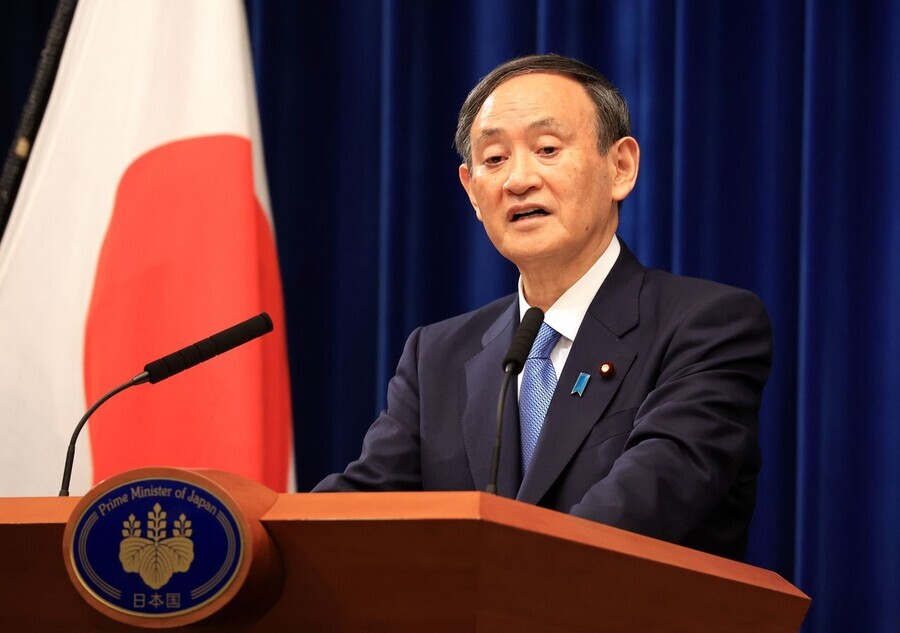hankyoreh
Links to other country sites 다른 나라 사이트 링크
Japan urges more “concrete solution” in response to Moon’s remarks on improving relations

After South Korean President Moon Jae-in expressed his strong resolution to improve relations with Japan in his New Year’s press conference on Jan. 18, the Japanese said his attitude shows progress but that they’d wait for a more concrete solution.
The solution the Japanese expect from South Korea would effectively neutralize South Korean court rulings that award damages to the victims of forced labor and the “comfort women” system of military brothels during the Japanese imperial period.
On Jan. 19, Japanese newspaper the Yomiuri Shimbun provided an in-depth analysis of Moon’s comment that it’s “undesirable” for the assets of Japanese companies to be liquidated to compensate victims of forced labor. “The impression is that [Moon’s] position has changed, since this could be taken as interference in the judicial branch.”
In regard to Moon’s remark that he “was frankly a bit thrown” by a judicial decision about the comfort women on Jan. 8, the Mainichi Shimbun, another Japanese newspaper, said that Moon had “expressed his intention to resolve historical disputes.”
But the position of the Japanese government as presented in the press remained unyielding. Right-leaning newspaper the Sankei Shimbun said that “the Japanese government’s response is cool,” quoting a senior member of Japan’s Ministry of Foreign Affairs as saying that “no steps have been taken toward a solution” and that “Japan-South Korea relations won’t improve without concrete action.”
And while Moon called for improving bilateral relations through dialogue, the Japanese government insisted that the Koreans need to find a solution before that can happen.
“The South Koreans must come up with a solution before deliberations take place [between Korea and Japan],” a senior member of Japan’s Foreign Ministry said in an interview with the Nihon Keizai Shimbun, another Japanese newspaper.
“We will strongly demand an appropriate response from the South Koreans based on our consistent position,” Japanese Prime Minister Yoshihide Suga said in a policy speech before the Diet on Jan. 18.
Japan’s position is that the issues of the labor conscripts and the comfort women were both resolved by a 1965 agreement that settled outstanding claims between the two countries and by a comfort women agreement reached in 2015.
“One option that has been raised between the two governments is for the South Korean government to purchase the assets seized from Japanese companies and then return them to those companies,” the Yomiuri Shimbun said, referring to legal steps taken to compensate victims of forced labor. That option would have the effect of preserving the judicial decision without causing financial harm to the Japanese firms.
“The standard on which the Japanese government will not compromise is making clear that Japan isn’t liable for damages. The Japanese government is unlikely to accept an option that assumes liability for damages, even if that option does avoid causing financial harm to Japanese companies,” the newspaper said.
The Yomiuri Shimbun also said that Tokyo “can’t accept” the court ruling awarding damages to the comfort women “since that violates sovereign immunity.” “Korea has no choice but to pressure the plaintiffs to invalidate their lawsuit,” the newspaper quoted a senior official of Japan’s Foreign Ministry as saying.
Since the solutions being discussed in Japan would require the South Korean government to completely reject rulings by South Korean courts, it seems unlikely that the two governments will be able to reach an understanding.
By Kim So-youn, staff reporter
Please direct comments or questions to [english@hani.co.kr]

Editorial・opinion
![[Column] Season 2 of special prosecutor probe may be coming to Korea soon [Column] Season 2 of special prosecutor probe may be coming to Korea soon](https://flexible.img.hani.co.kr/flexible/normal/500/300/imgdb/original/2024/0426/3317141030699447.jpg) [Column] Season 2 of special prosecutor probe may be coming to Korea soon
[Column] Season 2 of special prosecutor probe may be coming to Korea soon![[Column] Park Geun-hye déjà vu in Yoon Suk-yeol [Column] Park Geun-hye déjà vu in Yoon Suk-yeol](https://flexible.img.hani.co.kr/flexible/normal/500/300/imgdb/original/2024/0424/651713945113788.jpg) [Column] Park Geun-hye déjà vu in Yoon Suk-yeol
[Column] Park Geun-hye déjà vu in Yoon Suk-yeol- [Editorial] New weight of N. Korea’s nuclear threats makes dialogue all the more urgent
- [Guest essay] The real reason Korea’s new right wants to dub Rhee a founding father
- [Column] ‘Choson’: Is it time we start referring to N. Korea in its own terms?
- [Editorial] Japan’s rewriting of history with Korea has gone too far
- [Column] The president’s questionable capacity for dialogue
- [Column] Are chaebol firms just pizza pies for families to divvy up as they please?
- [Column] Has Korea, too, crossed the Rubicon on China?
- [Correspondent’s column] In Japan’s alliance with US, echoes of its past alliances with UK
Most viewed articles
- 1AI is catching up with humans at a ‘shocking’ rate
- 2After election rout, Yoon’s left with 3 choices for dealing with the opposition
- 3Is Japan about to snatch control of Line messenger from Korea’s Naver?
- 4No good, very bad game for Korea puts it out of Olympics for first time since 1988
- 51 in 5 unwed Korean women want child-free life, study shows
- 6Will NewJeans end up collateral damage in internal feud at K-pop juggernaut Hybe?
- 7Korea’s 1.3% growth in Q1 signals ‘textbook’ return to growth, says government
- 8Marriages nosedived 40% over last 10 years in Korea, a factor in low birth rate
- 9[Editorial] Japan’s rewriting of history with Korea has gone too far
- 10Why Korea shouldn’t welcome Japan’s newly beefed up defense cooperation with US